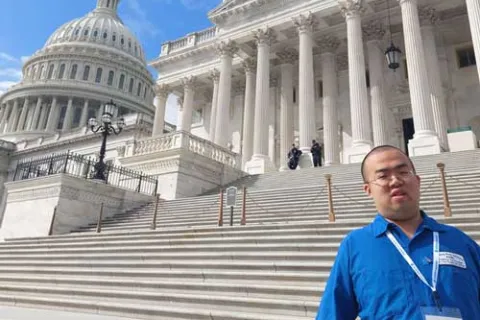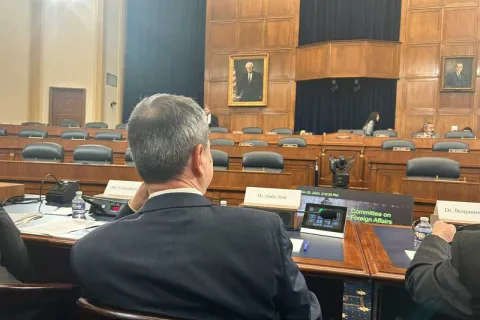Thought Leadership Summit on Challenging Behaviors opens with closer look at solutions to severe behavior
December 15, 2020Around age 14, her son’s behavior began to change, said Amy Hess.
“To see him go from a calm, easygoing child to a young man with intense and aggressive, and sometimes self-injurious, behavior was just shocking,” said Hess.
Hess, the Autism Treatment Network site coordinator at Nationwide Children’s Hospital, shared her autistic son’s five-year journey with intense behavior support needs to open the two-day Autism Speaks Thought Leadership Summit on Challenging Behaviors.
Experts, autistic adults and family members invited from across the country convened virtually Thursday to share best practices, research and perspectives on finding solutions to a struggle that many autistic people and their families experience.
Autism Speaks research in its Autism Treatment Network, funded as the Autism Intervention Network on Physical Health (AIR-P), found that 93 percent of patients seen at 12 network sites reported challenging behaviors, with 85 percent rating those behaviors as moderate or severe.
“Our network heard loud and clear from families that a range of challenging behaviors, from anxiety and irritability to behaviors that are a safety risk for their loved ones, were having a negative impact,” said Donna Murray, Ph.D., vice president of clinical programs at Autism Speaks. “This summit will help provide a framework for solutions that are so needed for autistic children and adults to reach their full potential.”
Failing to address severe behaviors as they emerge, Hess said, limits opportunities for people like her son.
“It keeps his world small,” Hess said.
Her son’s early agitated behaviors continued to become more frequent and intense over time, leading to broken windows, holes in the wall and fear for what the day would hold for her son and family.
Behavioral health professionals from the few autism centers that are equipped to treat severe behaviors agree that more help is needed for children like Hess’s son across the country. Participants agreed that families often keep these struggles quiet for fear of being shamed by others in the community or on social media.
“We need more stories, more advocates highlighting the reality of the spectrum of challenging behavior, which is very tough to balance with the beautiful strengths of autistic individuals,” said Kristin Sohl, M.D., a pediatrician at University of Missouri. “Amy's story highlights the reality that exists for real families every day, everywhere.”
Many programs, such as the neurobehavioral unit at Kennedy Krieger Institute in Baltimore, Md., see patients drive from hours away for outpatient services and from out-of-state for their most intensive program, a 4- to 6-month hospital stay with 24-hour care.
More outpatient care programs for intense and severe behaviors, plus the insurance coverage to help families pay for it, are critically needed in order to rely less on inpatient programs, which use more resources and staffing while taking people out of their home environments.
Louis Hagopian, Ph.D., director of the Kennedy Krieger inpatient program, said in-home support services to allow children to live at home while receiving interventions would be a huge step forward for effectively treating these challenges.
Staffing, training, building considerations and funding for the intense treatment needed to help people with severe and self-injurious behavior were obstacles highlighted by all the clinicians who presented.
As challenging behaviors emerge, practitioners agree, intervening early can help improve quality of life dramatically by allowing people to continue school, work and other activities they enjoy. It also saves an incredible amount of money over their lifetime, because behaviors that escalate to crisis levels require more intense treatment.
Annual costs for inpatient institutions can total as much as $250,000 in New Jersey, compared with just over $54,000 for home and community-based services.
For Hess’s son, who is minimally verbal, she knew that he also wanted help with his behavior when he managed to say, “Please don’t leave,” during one of his aggressive outbursts.
Three years later, with behavior management and medication, Hess’s son had better control of his behavior, and his career as an artist is thriving.
“Can you imagine waiting three years for resolution to severe and intense behavior?” Hess asked.
Over the next year, workgroups formed following the summit will develop tools for providers, autistic people and their families to help navigate these challenges. Research and policy initiatives developed with participants and other experts will also provide much-needed knowledge and support to those facing behavior challenges and people supporting them.
“Families do not always know where to begin to ask for help when challenging behavior is emerging or at crisis level,” Hess said. “Open and informational discussions of challenging behavior - even if they are not present - may help families initiate seeking help earlier.”








